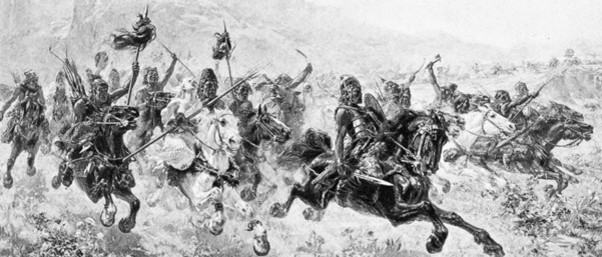Attila the Hun: Scourge of God
Posted on 27th March 2023
He was the Scourge of God who laid waste to much of Europe and stood triumphant before Rome quite literally the Barbarian at the Gates. Then he turned away – Why?
Attila who became the King of the Huns alongside his brother Bleda following the death of their uncle Rugila in AD 434 was to unite a people torn apart by dispute and blood feuds and turn them into one of the most formidable armies then known to history. He was both loathed and feared and those who met him trembled in his presence.
The Huns were a nomadic people who arrived in Europe from the Steppes of Central Asia around AD 370 and settled in the central plains of Hungary. The Historian Priscus described them thus:
"Though they do just bear the likeness of men (though of an ugly person) they are so little advanced in civilisation they make no use of fire, nor any kind of relish in the preparation of their food, but feed upon the roots they find in the fields, and the half-raw flesh of any animals."
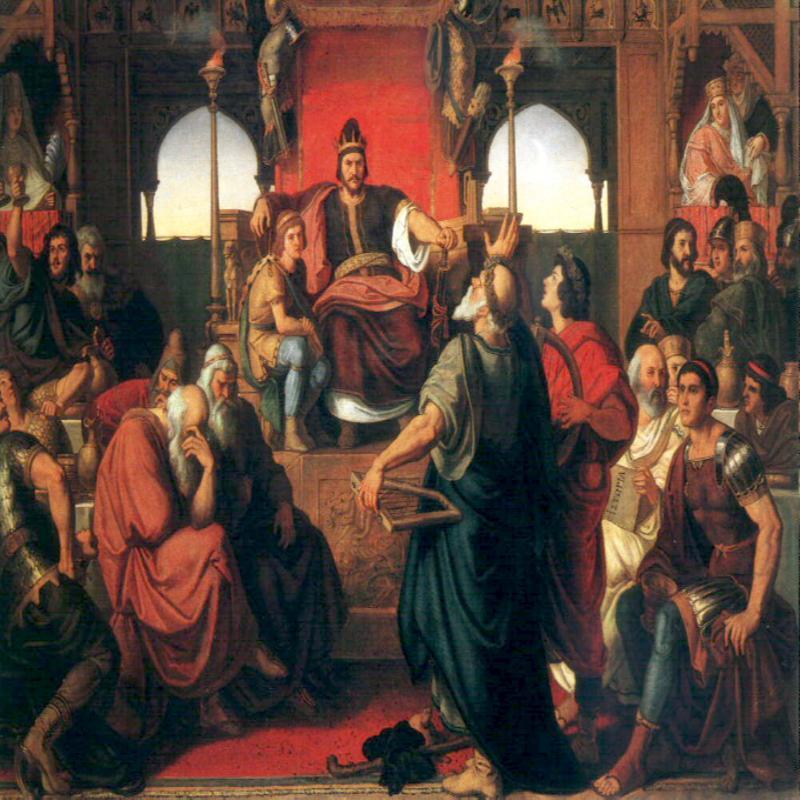
Their culinary skills may have been lacking but they were superb horsemen and ferocious warriors who would charge their enemies at speed firing arrows as they did so. They would then disperse just as quickly and then attack from elsewhere on the field often with nets strung between horsemen to entangle their enemies before dismounting and hacking them to death.
By AD 434 they were threatening the Eastern Roman Empire.
Unable to defend themselves militarily as once they had the Romans had taken to buying their enemies off and the Eastern Roman Emperor Theodosius II offered Attila and Bleda 660 pounds of gold and repatriate those nobles who had opposed their succession and had sought asylum in Constantinople if they agreed to leave the Empire alone. They agreed and took a particular delight in disposing of their repatriated opponents who they had tied between two horses made to gallop at pace and then watched as their bodies were torn apart.
For the time being then Attila and Bleda turned their attention towards Armenia and Theodosius, knowing the Huns would be back took the opportunity afforded him to reinforce the defences of Constantinople making it virtually impregnable.
In AD 440 the Huns attacked IIIyria and the Danubian Provinces destroying much of the Balkans in the process. The Historian Callinicus wrote: "The Barbarian Hun Nation became so great that more than a hundred cities were captured and destroyed and Constantinople itself came into danger, most men fleeing from it. And there were so many deaths and bloodlettings that the dead could not be numbered."
It was said that Attila was always eager to kill women and children who he not only considered a burden but knew that by doing so he would sew dread into the hearts of his enemies.
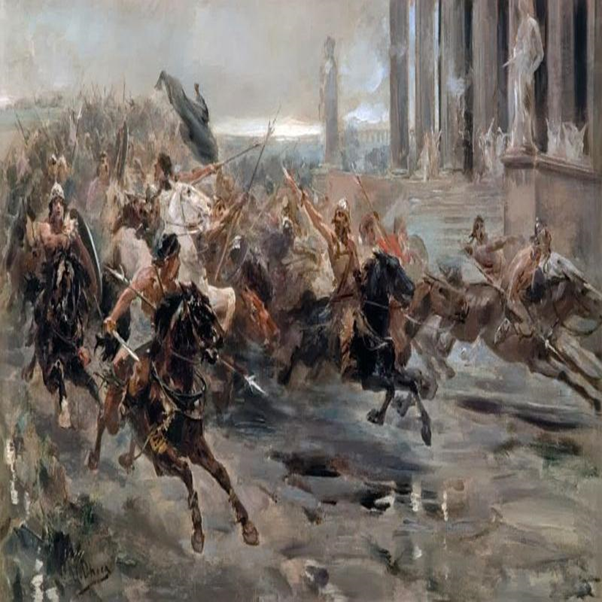
By AD 443 the Huns were rampaging across the Byzantine Empire virtually unopposed, and Theodosius was forced to act. Reinforced with troops from Sicily he rode out from his capital to challenge the invaders, but his campaign was a disaster.
Attila destroyed a Roman army outside the walls of Constantinople and was only prevented from taking the city by its formidable fortifications. After he destroyed a second Roman army at the Battle of Callinopolis, Theodosius was forced into a humiliating peace. He paid Attila and Bleda a further 700 pounds worth of gold, an annual tribute, and had to pay again for the release of every Roman prisoner taken. But at least he remained safe behind the walls of Constantinople.
In AD 445, Bleda was killed in a mysterious hunting accident and Attila became sole ruler of the Hun Empire. Freed of Bleda’s interference he now turned his gaze west where hungry for conquest he marched his armies through Austria and Germany destroying everything in his path. His destination was France where his declared aim was to destroy the Visigoth Empire centred round Toulouse. He intended to do this in alliance with the Western Roman Emperor Valentinian III with who he had remained on good terms.
The friendly relations between the two men broke down however when Valentinian's sister Honoria, angry at her brother's insistence that she marry an elderly Senator sent an engagement ring and a proposal of marriage to Attila. He was both surprised and delighted by the proposal and accepted immediately demanding half of the Western Empire as his dowry.
A furious Valentinian sent a letter to Attila denying the validity of the proposal. He then ordered that his sister be executed, and she was only saved from death by the tear-stained intervention of their mother. She was instead sent into exile. Meanwhile, Attila declared Honoria to be his wife and property and announced that he was coming to get what was rightfully his.
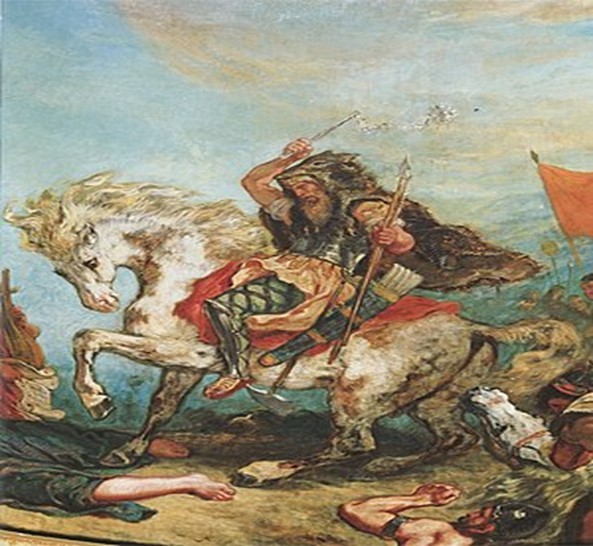
Attila who in his prime was described as: "Short of stature, with a broad chest and a large head, his eyes were small and his beard thin and sprinkled with grey, and he had a flat nose and tanned skin"’ as said to be a humourless man who was rarely heard to laugh or even to smile. He dressed plainly and wore no adornments or jewellery. He drank little and ate only sparingly. It was said that his children looked upon him with dread.
Valentinian who had broken off his alliance with Attila now joined forces with the Visigoth King Theodoric, but he remained in Rome while his army marched west under the command of his right-hand man Flavius Aetius. Attila, who had already put to the sword the cities of Rheims, Metz, and Nicasius would meet the combined forces of Rome and the Visigoth Kingdom on the plains of Chalons.
The Battle of Chalons which took place on 20 June, AD 451 is now considered to be one of the great turning points of history but it was not the one that Attila had not been expecting. His forces had been engaged besieging the town of Aurelanium or Orleans when much to his surprise the armies of Theodoric and Aetius appeared on the horizon. He hastily broke off the siege and formed a battleline.
The key to success in the coming conflict was a high ridge that dominated the plains below and both sides now raced to take possession of it. Theodoric and Aetius got there first.
The Huns repeatedly attacked the ridge but were repulsed each time and at great cost. The fighting was frantic and fierce but despite Theodoric being killed by nightfall the Huns had been forced to withdraw back into their camp in some confusion.
The defeat at Chalons was Attila's first ever serious military setback but it was by no means decisive. His army remained largely intact, and he awaited the attack he felt was sure to come in the morning with some confidence.
Thorismund, Theodoric's son and designated heir, was eager to assault the Hun camp and finish Attila off once and for all but Aetius was more cautious. Attila had been defeated and his invasion of the Western Empire thwarted for the time being. Why risk everything now?
The truth was Aetius feared the power of the Visigoths as much as he did that of the Huns and angry at his ally’s reluctance to continue the battle Thorismund now withdrew his army to the Visigoth capital at Tolosa forcing Aetius also to withdraw.
Attila remained in camp for a few days uncertain of the situation but aware the battle had been a particularly bloody one which had left many of his men dead on the field. Finally, he withdrew his army back across the Rhine greatly weakened, to lick his wounds.
The Battle of Chalons had seen the aura of Hun invincibility shattered though it did little to diminish Attila's fearsome reputation neither had it destroyed the Hun Army or ended the Hun threat, but it had saved Western Europe from falling to the Asiatic Horde.
Despite the defeat at Chalons, Attila would be back and within a few months he was this time attacking Italy directly rampaging across the Lombard Plain laying waste as he did so and destroying the city of Aquilea. Valentinian, in a panic fled his capital at Ravenna and sought sanctuary with Pope Leo I in Rome - he could no longer do anything to prevent Attila from seizing the whole of the Western Empire.
Rome now lay at the Hun leader’s mercy, but he declined to attack it. Why has remained a subject of conjecture ever since.
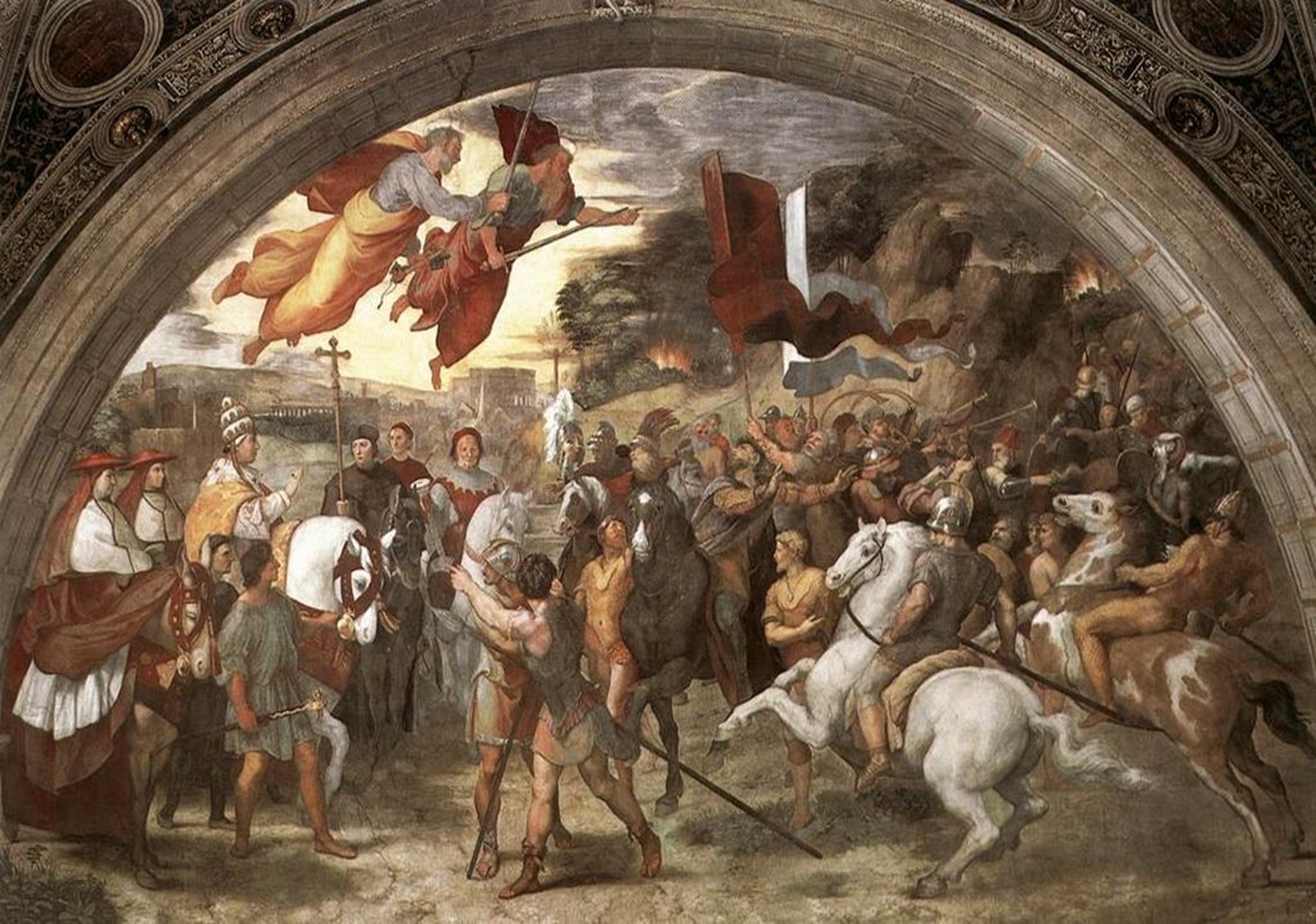
Attila is known to have had a meeting with Pope Leo I who promised him a Holy Crown and a place alongside the Saints in Heaven if he turned away from Rome. But why would Attila, who was not a Christian, be influenced by such things? He was though a deeply superstitious man who would have been aware of the fate that befell Alaric, the leader of the Goths, who had died just days after sacking Rome in AD 410.
There may have been more prosaic reasons, however. The Huns had never successfully besieged a major city and he had also lost a great many of his best warriors at Chalons. He was also concerned that he may have to cross the Alps in winter or face being trapped in Italy. Whatever the reason, he now turned away from the Gates of Rome.
Less than a year later Attila the Hun, the Scourge of God, was dead.
It was the night of his marriage and the usually sober Attila had drunk heavily. He had retired to his bedchamber alone where he passed out. In doing so he smashed his nose on the stone floor which caused it to bleed so profusely that he drowned in his own blood. It was an ignominious end for the most feared man in the known world.
Attila the Hun was buried in a lead coffin beneath the waters of the River Tisza in Hungary. Those who had participated in the burial were executed to ensure the exact location remained a secret - but then as the Historian Jordanes noted:
"The greatness of warriors should not be mourned with feminine lamentations and the tears of women, but with the blood of men."
Tagged as: Ancient & Medieval
Share this post:





